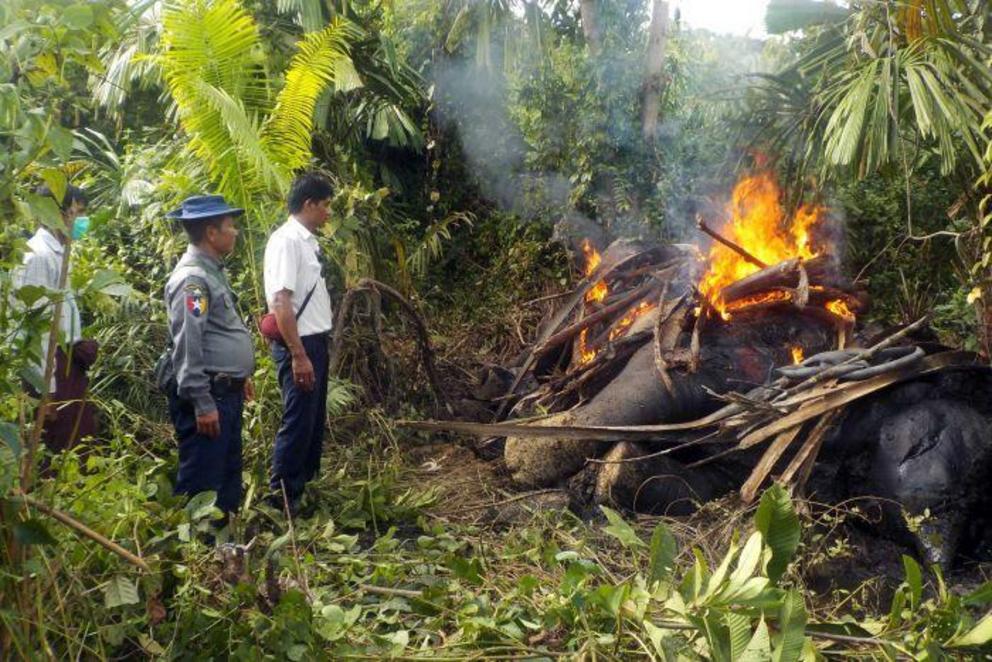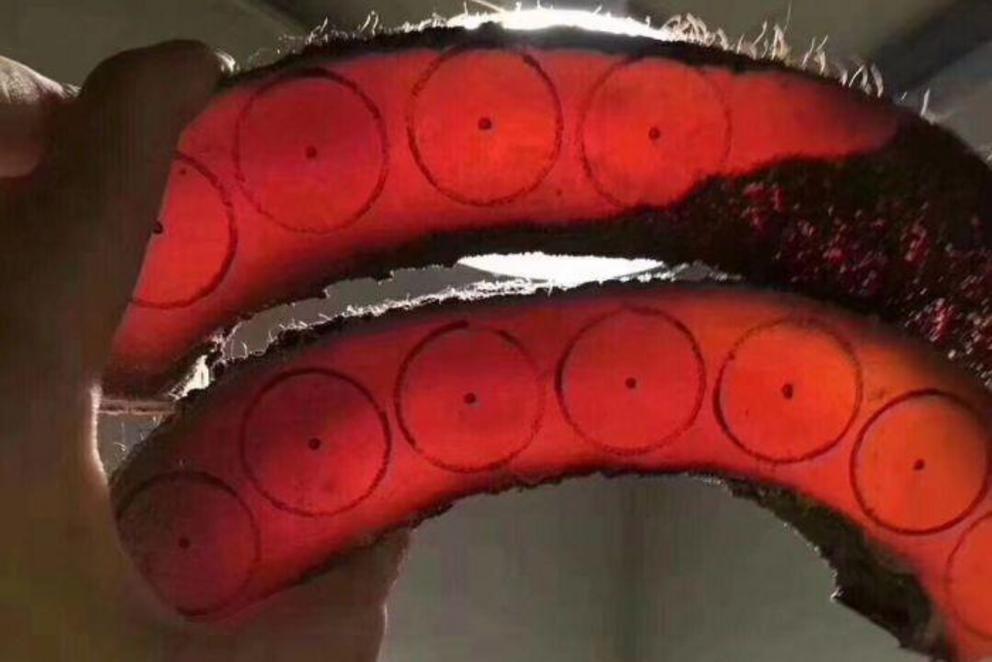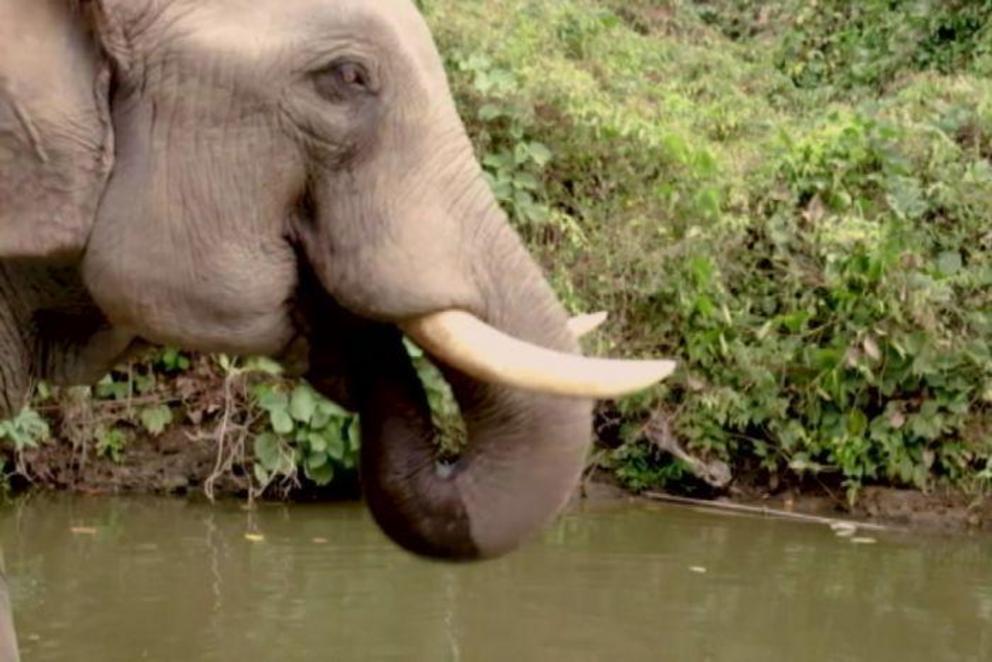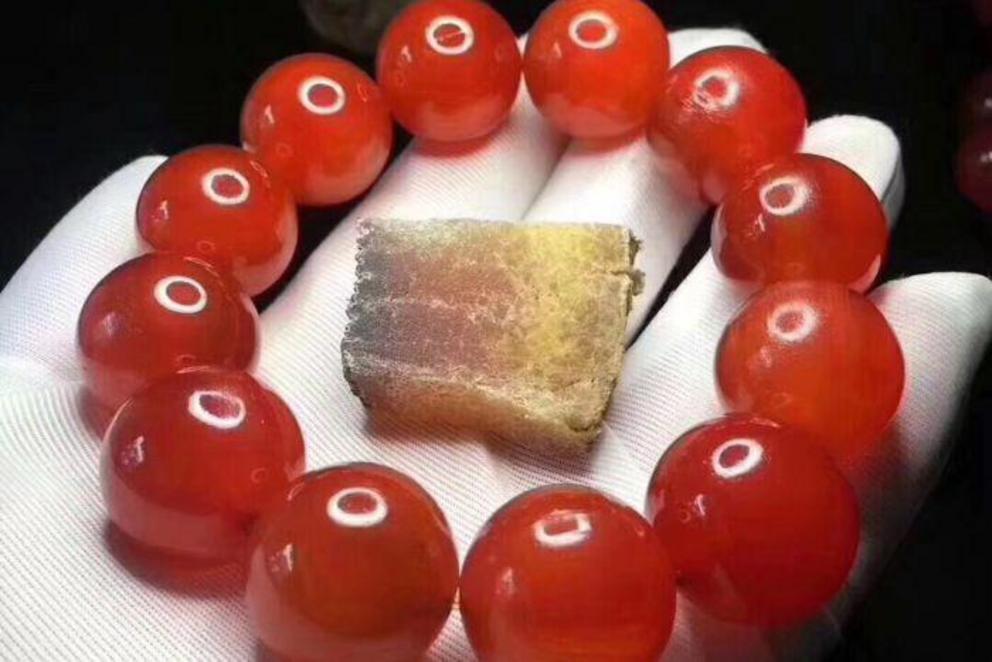Chinese desire for 'blood beads' and (poisonous) skin cream threatening the existence of Myanmar's elephants
A bracelet of elephant blood beads being offered for sale online.
The online trader wants his customers to know the elephant was skinned quickly, with blood still fresh in its veins.
He holds two layers of dried, hardened fat in front of a light to show off the rich blood-red colour, circles marked for where he will cut spheres and turn them into beads for a bracelet.
"That's why they try to skin the elephant as soon as it falls down," Aung Myo Chit, country coordinator at the Smithsonian Institution in Myanmar, told 7.30.
"Because after you wait one or two days, it will drop the colour ... the concentration of blood will reduce.
"One female elephant was skinned before she died."
Every elephant now a target
 Myanmar officials burn the corpse of an elephant killed by poachers.
Myanmar officials burn the corpse of an elephant killed by poachers.
This trade in elephant skin — for beads, bogus cures and skin products — was first detected just a few years ago. It has conservationists worried.
"The new skin trade is so serious that if it's left unchecked, Myanmar's elephants could disappear by 2030," Christy Williams, country director at World Wildlife Fund said.
Hunting for ivory targets the approximately 10 per cent of male elephant with tusks, but this new skin trade puts every single elephant in the poachers' gun sights.
"So that was the game changer for us," Mr Williams said. "Basically any living elephant in the wild was fair game."
The wider threat posed by the skin poachers was brought home powerfully in May last year, when a whole family of elephants was killed in Myanmar's Ayerawaddy region.
In all 25 males, females and calves were slaughtered, their blood turning the river red.
"I just think that what we do to animals like elephants, dolphins, whales or great apes is genocide," Mr Williams said.
Poisoned lotion for sale
 A picture advertising Asian elephant skin online
A picture advertising Asian elephant skin online
From the forests of Myanmar, the illicit elephant skin is smuggled towards China, either via Thailand and Laos or through the notorious border town wildlife market of Mong La.
"From our interviews with the shopkeepers, 90 per cent of the consumers are Chinese," said Mr Williams.
Much of the elephant skin ends up for sale online.
The conservation group Elephant Family found photos of the trader showing off his blood-red products last month and also tracked down the origin of the beads.
While carved bead bracelets known as wenwan have long been traditional items of jewellery in China, the use of elephant skin was virtually unheard of until 2014, when a single online trader known as Jaz developed a new product.
According to an investigation by Elephant Family, Jaz boasted of his exploits.
"I invented the elephant skin beads," Jaz is reported to have said.
"I even go to Myanmar and source the raw material myself."
Jaz also pioneered the online trade of powdered elephant skin being sold as a cure for stomach aches and mixed into lotion for skin conditions.
 Conservationist, Aung Myo Chit, says the elephant skin products could be poisonous for humans.
Conservationist, Aung Myo Chit, says the elephant skin products could be poisonous for humans.
Aung Myo Chit said that these products have no proven medicinal value, and could actually be harmful to the consumer.
Poachers use homemade guns and arrows tipped with strong poison to bring down the elephant in a slow, excruciating death.
"Two or three days later, the poison has spread to the whole body, every inch of the skin has the poison," Aung Myo Chit said.
That poison is then being consumed or rubbed onto the skin of the customer.
 Conservationist, Aung Myo Chit, says the elephant skin products could be poisonous for humans.
Conservationist, Aung Myo Chit, says the elephant skin products could be poisonous for humans.
Ranger power
 There are estimated to be only a couple of thousand of elephants left in the wild in Myanmar.
There are estimated to be only a couple of thousand of elephants left in the wild in Myanmar.
Conservationists say urgent action is needed to protect Myanmar's estimated 2,000 wild elephants.
This week saw the Illegal Wildlife Trade conference held in London. While safeguarding African elephants was a key topic, the emerging trade in Asian elephant skin was not a major agenda item.
Activists are trying to shift the conversation; they want the world to see elephant skin poaching as the new ivory.
"As a range state we are aware of the multiple threats faced by Asian elephants and are concerned that the skin issue will expand to all range states if not stopped," Ranjan Marasinghe, head of enforcement of the Department of Wildlife Conservation in Sri Lanka, told 7.30.
There have been some positive signs in Myanmar, with the Government strengthening the law this year, bringing in a mandatory minimum jail terms for poachers.
Fitting GPS collars to small numbers of elephants in poaching hotspots has allowed rangers to focus their patrols where they can be most effective.
But it has also shown the scale of the threat.
In the first year the World Wildlife Fund (WWF) collared elephants, half of them were killed.
 Christy Williams says more rangers are needed to protect Myanmar's elephants.
Christy Williams says more rangers are needed to protect Myanmar's elephants.
However Christy Williams believes Myanmar has a unique opportunity to protect its wildlife and create jobs.
The South-East Asian nation has a huge commercial timber sector, with thousands of staff and thousands of trained elephants working at state-run business logging firms.
But the glory days of Myanmar's teak trade are dwindling.
Mr Williams would like to see Myanmar take some of its timber workers and retrain them as forest rangers, and WWF is working on a ranger training facility to help make that a reality.
He cites results in Nepal as evidence the idea could work.
"Nepal's Chitwan National Park has celebrated five years of zero poaching of rhinos, [but] they have 1,600 staff, including 1,000 soldiers protecting the park," he said.
"[For] the whole of Myanmar's 40 protected areas there's 450 staff. We need more boots on the ground.
"If it's not checked now, it could easily spread to other parts of Asia, where there's no protection for Asian elephants, then you're really fighting to save the last few individuals."

